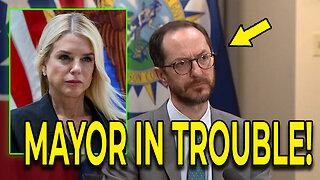Premium Only Content

Hitler's Speech on May 18, 1928
Background Leading Up to Hitler's Speech on May 18, 1928
Weimar Republic Challenges: Germany in 1928 was under the Weimar Republic, a period marked by political instability, economic fluctuations, and societal changes following World War I.
Nazi Party Position: At this time, the National Socialist German Workers' Party (NSDAP), led by Adolf Hitler, was still in a phase of gaining traction and increasing its influence. The party had faced setbacks but continued to push its agenda of nationalism and opposition to the Treaty of Versailles.
Economic Context: While the mid-1920s had seen some economic stabilization with the help of the Dawes Plan, which restructured Germany's reparation payments, many Germans still felt discontented with the economic situation and the perceived injustices of the Versailles Treaty.
Political Climate: The political climate was highly fragmented, with numerous parties vying for power in the Reichstag (German parliament). Extremist parties, both on the left and right, were gaining support as many Germans lost faith in the centrist parties.
Hitler's Speech on May 18, 1928
On May 18, 1928, Adolf Hitler delivered a speech aimed at consolidating support for the Nazi Party and articulating its vision for Germany’s future.
Key Points of Hitler's Speech:
Critique of the Weimar Government: Hitler criticized the Weimar Republic for its perceived weaknesses and failures. He argued that the government was unable to address the needs of the German people and had betrayed the nation's interests by adhering to the Treaty of Versailles.
Denouncement of the Treaty of Versailles: A significant portion of the speech focused on condemning the Treaty of Versailles, which Hitler described as a national humiliation. He blamed the treaty for Germany’s economic woes and loss of territories.
Economic Hardships: Hitler highlighted the economic struggles faced by ordinary Germans, including unemployment and inflation. He used these issues to illustrate the failings of the current government and to emphasize the need for change.
Call for National Unity: Emphasizing the importance of national unity, Hitler called for Germans to come together to rebuild and strengthen the country. He argued that only through unity could Germany overcome its challenges and reclaim its rightful place in the world.
Promotion of Nazi Ideals: Hitler reiterated the core ideals of the Nazi Party, including nationalism, the need for a strong, authoritative government, and the rejection of communism and socialism. He portrayed the party as the only force capable of restoring Germany's greatness.
Appeal to Youth: Recognizing the importance of youth in the movement, Hitler specifically addressed young Germans, urging them to join the Nazi cause and to be part of the nation’s revival. He framed the youth as the future leaders and saviors of Germany.
Promise of Renewal: Hitler promised a renewal of Germany under Nazi leadership, one that would bring economic prosperity, national pride, and a strong, unified state. He assured his audience that the Nazi Party had the vision and the plan to achieve these goals.
Analysis:
Hitler’s speech on May 18, 1928, was part of his broader strategy to build support for the Nazi Party by tapping into the widespread dissatisfaction with the Weimar Republic and promoting a vision of national revival.
Exploitation of Economic Discontent: By focusing on economic hardships, Hitler aimed to resonate with the frustrations of ordinary Germans. He portrayed the Weimar government as ineffective and responsible for the economic struggles, thereby positioning the Nazi Party as the alternative.
Condemnation of Versailles: The consistent denouncement of the Treaty of Versailles was a strategic move to unite Germans around a common grievance. By framing the treaty as the root cause of Germany’s problems, Hitler sought to galvanize support for his party’s nationalist agenda.
National Unity and Strength: The call for national unity was a central theme, intended to bring together a divided populace under the banner of Nazi ideology. Hitler’s emphasis on unity and strength was meant to contrast sharply with the perceived fragmentation and weakness of the current government.
Appeal to Youth: By targeting the youth, Hitler aimed to secure the future of the Nazi movement. He understood that the younger generation would be crucial in sustaining the party’s momentum and ensuring long-term success.
Vision of Renewal: The promise of renewal and a brighter future under Nazi leadership was designed to inspire hope and to convince Germans that the party had the solutions to the country’s problems. This optimistic vision was a powerful tool for gaining and maintaining support.
Overall, Hitler’s speech on May 18, 1928, was a calculated effort to exploit the existing discontent in Germany, to criticize the Weimar Republic, and to promote the Nazi Party’s vision for a strong, unified, and prosperous nation. By addressing economic issues, condemning the Treaty of Versailles, and calling for national unity, Hitler sought to position the Nazi Party as the savior of Germany and to rally support for its cause.
-
 1:14:49
1:14:49
Mike Rowe
19 hours agoDavid Mamet Pulls No Punches When It Comes To Hollywood & Politics | #440 | The Way I Heard It
37.1K22 -
 LIVE
LIVE
ttvglamourx
3 hours ago $0.59 earnedPLAYING WITH VIEWERS !DISCORD
202 watching -
 15:19
15:19
T-SPLY
16 hours agoMayor Busted: Nashville Mayor Not Concerned Over Leaking Federal Agents Information!
25.8K79 -
 14:05
14:05
Mrgunsngear
3 hours ago $1.36 earnedHolosun 507 Comp Review: The Best Pistol Optic?
10.1K6 -
 4:15:39
4:15:39
MDGgamin
5 hours ago🔴LIVE - Wake Up Stream Repeat!! - Variety of Games & Chatting - #RumbleTakeover
11.7K -
 LIVE
LIVE
Major League Fishing
3 days agoLIVE Tackle Warehouse Invitationals, Stop 5, Day 2
99 watching -
 LIVE
LIVE
rosssims
2 hours agoFOR SUPER EARTH! 💥 Simsy's Helldivers 2 Galactic War | Live Today ‽ ‽ ‽ 6/21/2025
91 watching -
 2:35:21
2:35:21
blackfox87
4 hours agoWild Roots Time!| #SponsoredStream | #DisabledVeteran
37K2 -
 8:42:04
8:42:04
SquallRush
12 hours agoExperimenting with Non Meta Decks in Ranked
50.6K4 -
 2:01:12
2:01:12
Game On!
18 hours ago $4.54 earnedOur MLB Expert Predicts Braves to WIN the World Series!
42.8K